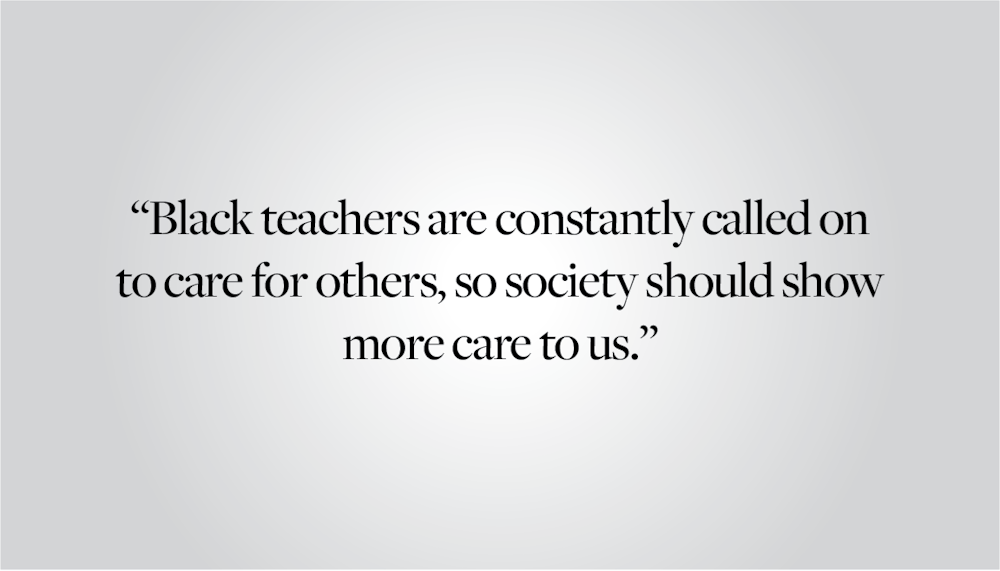As a self-proclaimed “Abbott Elementary” fanatic, I have seen every episode of the series at least twice. The show follows teachers at a Philadelphia public school in a documentary-style format similar to “The Office” and explores a wide range of educational issues, including teacher shortages, charter schools and tracking — the method that schools use to group students based on perceived ability, which is often biased by race and class. The episode of “Abbott Elementary” that feels most relevant to me is “Light Bulb.” Janine, the main character and overly enthusiastic teacher, faints after trying to simultaneously teach and fix the school facilities on an empty stomach. Melissa and Barbara, the veteran teachers, warn her about caring too much and advise her that teachers can’t afford to burn out if they want to continue caring for their students.
As a Black female educator, I struggle to say no, just like Janine. I struggle to say no when my students ask for office hours beyond my allotted eight hours per week, so I hold them anyway. I struggle to say no when my dance students at the community center want to see a real dance studio, so I organize a field trip to accommodate. When you struggle to say no, like me and Janine, you continually search for the balance between self and community care; after all, one cannot exist without the other. Recently, I have practiced self care by avoiding doomscrolling — endlessly browsing through negative online media — through articles about Florida’s recent ban on Advanced Placement African American Studies. But my approach to Florida’s situation does not mean I do not care about Black education — I just want society to show Black teachers the same level of care it asks from us.
As a Black teacher, I already know the common misconceptions about Black education. I know AP African American Studies haters will spout the dangers of “CRT” and claim the course is “anti-American.” When I see haters criticize Black Studies, I wonder which “CRT” they are referring to: “Critical Race Theory” or “Culturally Relevant Teaching.” If they are referring to the former, I can assure them that Critical Race Theory is a complex legal framework that “denotes that systemic racism is part of American society.” As an upper-level undergraduate student, I struggle to fully comprehend the framework and guess most high schoolers will too. If the haters are referring to the latter, I wonder what can possibly be wrong with a teaching method that meets students' learning and cultural needs. Is the issue that we are meeting Black students' desires?
This leads me to the second misconception: AP African American Studies is “anti-American.” This country was built on slave labor, shaped by Black culture and continues to profit off of Black incarcerated bodies. In brief, the modern United States would not exist without the contributions of Black people. So then how can Blackness be anti-American — and why is teaching about Blackness criminalized, as in Florida’s “Stop WOKE Act?”
While it is important to create and include Black histories in schools, it is also important to recognize that this work comes with a mental burden that disproportionately falls on Black educators. Questioning my history, reflecting on Black representations in curricula and contemplating Black criminality is emotional labor. Implementing Black history lessons is only one of the many additional tasks Black educators are asked to do. Black educators face discrimination in teacher education programs and amongst colleagues, while also serving as sources of support and advocates for students of color. Black teachers are constantly called on to care for others, so society should show more care to us.
So you made it this far, and you’re wondering: “How do I care for Black educators, students, and curricula?” I’m sorry to break it to you, but reposting about Florida’s ban is not enough. You can start by reflecting on your compliance with the Black educational experience at Brown. For instance, are you more likely to dismiss the lived experiences of Black students and students of color in class discussions because they are anecdotal? When you meet a Black social sciences, humanities or arts concentrator do you feel their work is less valid? Have you ever repeated an insightful discussion point from a Black student and not given them credit? While these are important questions to consider, I also urge you to think outside the Brown bubble about the myriad of ways in which education and society more broadly disregard Black bodies.
There are also a wide array of people advocating for Black stories and knowledge beyond reposting on social media. Recently, alongside my fellow executive members of the Black Student Union, the Black Heritage Series Coordinators and Harambee House leadership, I shared stories about Black activism from Brown’s past and present through our Legacy of Black @ Brown Event. Currently, a coalition of Providence youth is advocating for Ethnic Studies to diversify the curriculum in Providence Public Schools. Last week, Black Lives Matter at School, a national group promoting racial equity in K-12 education, had a week of action centering Black creativity, schools and joy.
I promote my Black joy by not doomscrolling, but that does not mean I do not care. I care because of the magical moment when the little Black girls I babysit can point to “Hair Love.” I care because my college counselor advised me not to take African American history because it would not be considered rigorous enough by Brown. I care because Black education is my future. In order to keep doing the work, I just cannot afford to care too much and end up passing out like Janine.
Jada Wooten ’24 can be reached at jada_wooten@brown.edu. Please send responses to this opinion to letters@browndailyherald.com and other op-eds to opinions@browndailyherald.com.





